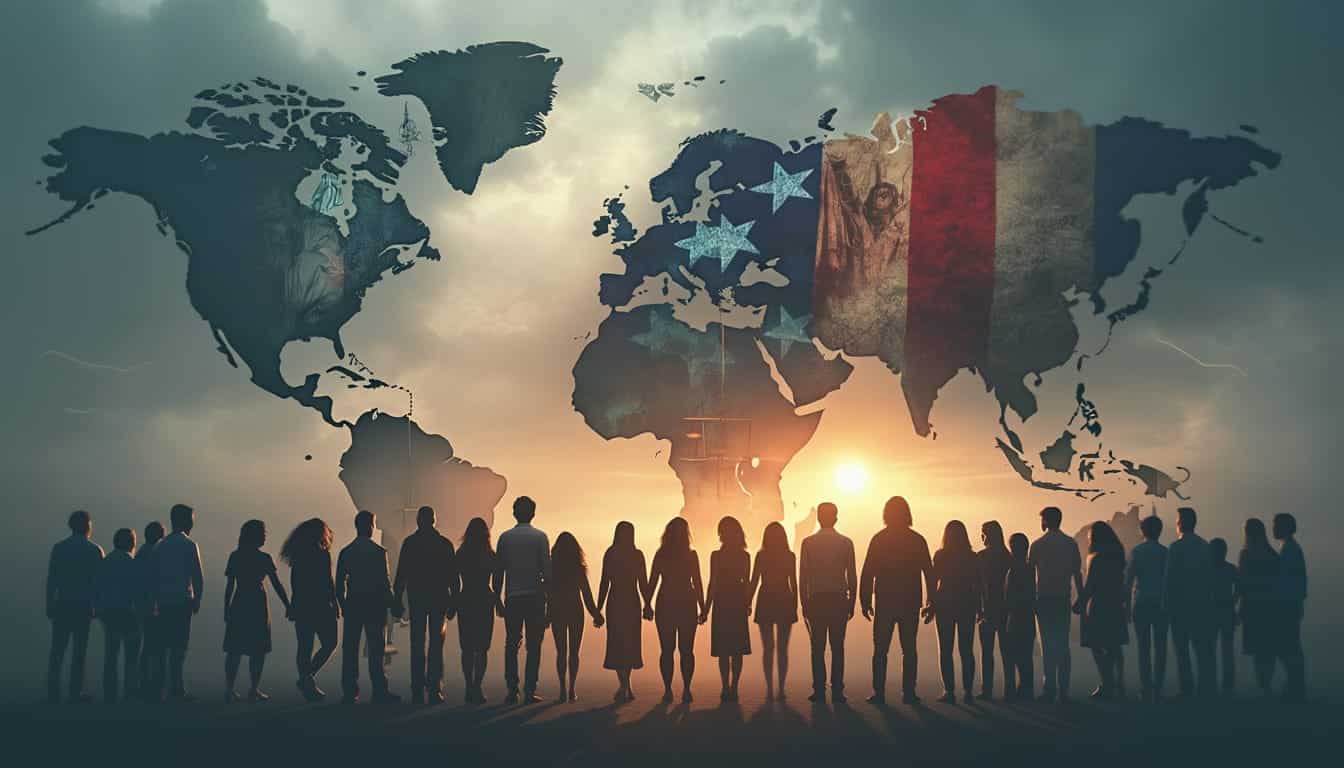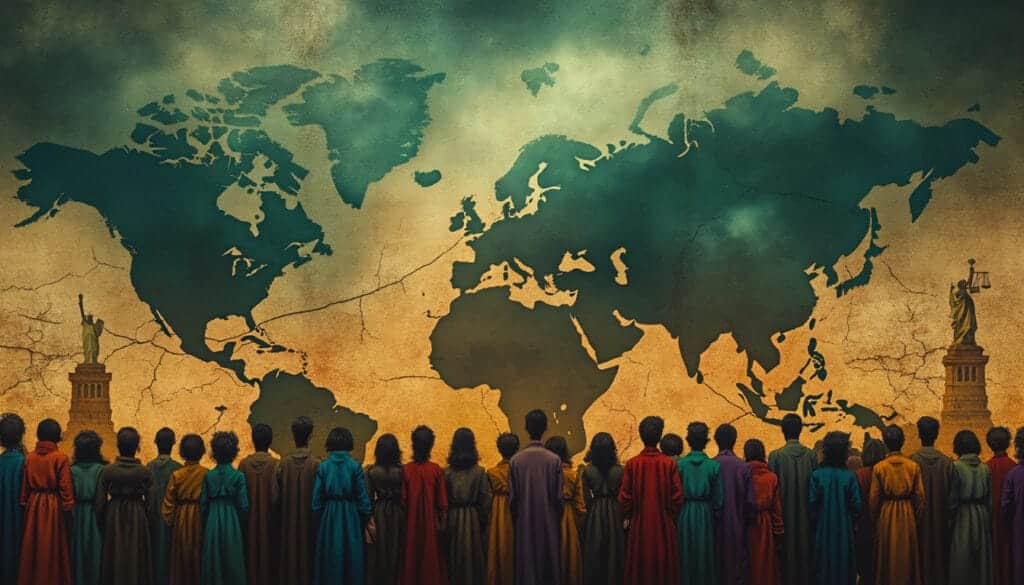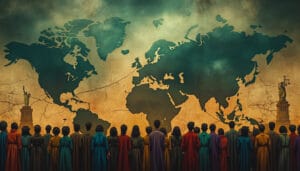The winds of change are blowing with unprecedented intensity. As the world navigates through political and environmental turbulence, the challenges for a sustainable future are multiplying.
The recent shift in global policies has a considerable impact on efforts to promote renewable energy. Backsliding on human rights and climate crises underline the urgency to adopt innovative solutions. In this context, wind energy emerges as a crucial response to reduce our dependence on fossil fuels. Political obstacles are no longer merely local challenges but global issues requiring international cooperation. The resilience of wind infrastructure in the face of global changes demonstrates their essential role in the energy transition. As an industry stakeholder, it is imperative to remain engaged and promote sustainable practices. This is how we can hope for a greener and more equitable future for all.

Table of Contents
ToggleWhat were the immediate impacts of Trump’s first 100 days on global human rights?
The first 100 days of Donald Trump’s presidency have had profound and alarming repercussions on human rights on a global scale. According to Amnesty International’s annual report, this period marked a significant acceleration of the regression of fundamental rights, propelling the world toward an authoritarian era characterized by impunity and unchecked corporate power. The reforms implemented by Trump undermined decades of progress, encouraging authoritarian leaders to tighten their grip on their nations.
How did Trump’s policies influence the global climate crisis?
The Trump administration has evidently exacerbated the global climate crisis by drastically reducing international actions aimed at combating global warming. The withdrawal from the Paris Agreement and the reduction of support for climate initiatives have weakened collective efforts to curb greenhouse gas emissions. This inaction has notably led to the failure of the Cop29 conference, demonstrating the harmful influence of fossil corporations on environmental policies. Concurrently, financial shields intended to aid vulnerable nations have been cut, leaving entire communities without resources to cope with climate disasters.
What was Trump’s approach to migration and refugees?
Trump’s presidency was marked by a harsh and uncompromising migration policy. The work of Amnesty International reveals a rise in arbitrary arrests and forced detentions of migrants, reflecting a climate of scapegoating. US Immigration and Customs Enforcement agents conducted intensive raids, such as in Chicago, to seek out undocumented migrants. This xenophobic rhetoric not only deteriorated international relations but also exacerbated the suffering of those fleeing conflicts and persecution.
How has the international reaction to human rights violations changed under Trump?
The rise of authoritarianism and Trump’s reduced commitment to international institutions have made the global community less responsive to human rights violations. For example, the response to the civil war in Sudan remains hesitant, despite the atrocities committed by the Rapid Support Forces. This inaction is symptomatic of global disengagement, where governments hesitate to intervene, leaving civilians unprotected. To learn more about the responsibility of climate change in the face of authoritarianism, check out this article.
What are the effects of US policy on the rights of women and LGBTQ+ individuals?
The Trump administration had a detrimental impact on the rights of women and LGBTQ+ individuals. By reducing protections and supporting regressive policies, the government contributed to a rise in discrimination and targeted attacks. Initiatives for gender equality were sidelined, and protections for transgender individuals and women were dismantled. This not only isolated vulnerable communities but also encouraged anti-rights movements worldwide, exacerbating social tensions and inequalities.
How have Trump’s actions affected international justice and global institutions?
Trump systematically undermined international institutions that advocate for justice and human rights. By withdrawing from crucial agreements and reducing support for global organizations, he weakened the ability of these entities to operate effectively. Sacha Deshmukh, CEO of Amnesty International UK, described this strategy as “terrifying,” highlighting the risk that the very foundations of international law could collapse. This erosion of international legal structures has created a void conducive to the rise of authoritarian regimes and the increase of human rights violations worldwide.
What links exist between Trump’s policies and global economic inequalities?
The economic policies of Trump, focused on reducing foreign aid and supporting large corporate interests, have aggravated global economic inequalities. By cutting funding for essential programs in countries like Yemen and Syria, he left millions of people without access to food, housing, or healthcare. This strategy not only exacerbated global poverty but also favored the enrichment of billionaires at the expense of the most vulnerable populations. To explore new investment opportunities in clean energy, check this article.
What role have corporations played in the deterioration of human rights under Trump?
Corporations gained excessive power under the Trump administration, often at the expense of human rights. The cooperation between the government and large corporations enabled increased impunity, facilitating practices contrary to fundamental rights. This alliance has bolstered anti-rights movements, leaving local governments powerless against abuses perpetrated by private entities. The case study of Vattenfall during the Cop29 illustrates how corporations can negatively influence environmental and social policies. To learn more, visit this page.
How can renewable energy initiatives counter the negative effects of Trump’s policies?
In the face of regression in human rights and climate policies, renewable energy initiatives present a promising solution for fostering positive change. By investing in clean and sustainable technologies, such as wind energy, it is possible to reduce dependence on fossil fuels and promote a more equitable economy. Innovative projects, such as those led by Michael Grätzel in the field of future solar cells, show the way toward a greener and fairer future. Discover the work of Michael Grätzel here.
What are the current and future challenges for human rights advocacy after Trump’s early days?
The challenges for human rights advocacy remain immense following the measures taken during Trump’s early days. The increase in authoritarianism, the rise of social injustice, and economic inequalities require a global mobilization. The international community must intensify efforts to restore weakened institutions and support rights advocacy movements. Moreover, it is crucial to continue raising awareness and educating on issues of social justice and equality, to ensure that future generations do not suffer from the gaps left by past policies.
How can international solidarity help reverse the decline of human rights?
International solidarity is essential to counter the decline of human rights instigated by Trump’s policies. By strengthening cooperation among nations and supporting non-governmental organizations, it is possible to restore gains in fundamental rights. Collaborative initiatives, such as those promoted by Amnesty International, play a crucial role in monitoring and denouncing abuses. Additionally, by sharing best practices and providing financial support to human rights programs, the international community can help rebuild a fairer and more equitable world order.
What is the future of human rights in light of Trump’s actions and international responses?
The future of human rights largely depends on the ability of global actors to unite and respond coherently to the challenges posed by authoritarian policies. Trump’s actions have underscored the need for increased vigilance and community resilience to protect fundamental freedoms. As nations seek to strengthen international legal frameworks and promote more transparent governance, it is crucial to continue advocating for education and awareness of human rights. Ongoing commitment to sustainable and equitable initiatives will determine whether the world can reverse the alarming trend initiated during Trump’s early days.
Dans ce cadre, la Défenseure des droits présente plusieurs recommandations afin que les garanties prévues par la loi soient pleinement concrétisées.
— Défenseur des droits (@Defenseurdroits) November 13, 2024
🔗 https://t.co/oe3QWuEHUW
Articles similaires
Thank you!
We will contact you soon.












